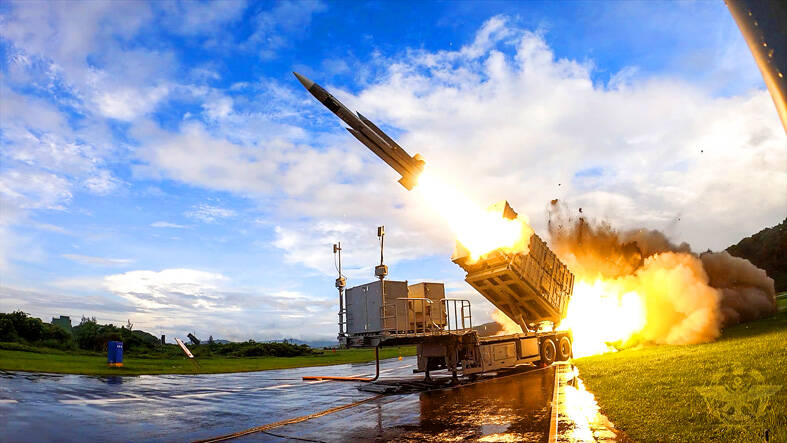The Ministry of National Defense plans to increase the production of anti-ship missiles from this year to 2025 to bolster the nation’s maritime defenses, an official said yesterday.
The extended-range variant of the Hsiung Feng III anti-ship missile is entering mass production this year, while the production volume of the Hsiung Feng II and the base model of the Hsiung Feng III is to be ramped up, the official said, speaking on condition of anonymity.
The estimated cost for the missiles this year is NT$15.5 billion (US$497.83 million), rising to NT$19.8 billion next year before peaking at NT$22 billion in 2025, they said.

Photo: EPA-EFE / Ministry of Defense / Handout
The ministry’s plan to increase its supply of anti-ship missiles comes as the Chinese People’s Liberation Army Navy accelerates its shipbuilding programs and conducts military exercises in the waters around Taiwan, they said.
The military considers anti-ship missiles the most direct and effective weapon system to check Chinese naval forces, the official said, adding that missile systems are to be deployed throughout the nation.
The Hsiung Feng II missile variant has a standard engagement range of 148km, while the new variant of the Hsiung Feng II missile being produced has a range of 160km to 200km, improved maneuverability and its electronic countermeasures are on par with Western systems, they said.
The Hsiung Feng III currently being used has a standard engagement range of 150km to 200km, while the extended-range variant has an effective range of 400km, the official said.
The improved Hsiung Feng III missiles are expected to significantly boost the engagement range of the nation’s anti-ship weapons and enhance the military’s ability to strike targets in seas to the north, south and east of Taiwan proper, they said.
The nation is on track to produce more than 1,000 anti-ship missiles by 2026, which is the last year of the Sea-Air Combat Power Improvement Plan, the ministry told the legislature in a previous report.
The defense industry has the capacity to produce 201 missile systems per year, including 131 Hsiung Feng II or Hsiung Sheng missiles, which share an assembly line, and 70 Hsiung Feng III missiles of the base or extended range variant, it said.

ENDEAVOR MANTA: The ship is programmed to automatically return to its designated home port and would self-destruct if seized by another party The Endeavor Manta, Taiwan’s first military-specification uncrewed surface vehicle (USV) tailor-made to operate in the Taiwan Strait in a bid to bolster the nation’s asymmetric combat capabilities made its first appearance at Kaohsiung’s Singda Harbor yesterday. Taking inspiration from Ukraine’s navy, which is using USVs to force Russia’s Black Sea fleet to take shelter within its own ports, CSBC Taiwan (台灣國際造船) established a research and development unit on USVs last year, CSBC chairman Huang Cheng-hung (黃正弘) said. With the exception of the satellite guidance system and the outboard motors — which were purchased from foreign companies that were not affiliated with Chinese-funded

PERMIT REVOKED: The influencer at a news conference said the National Immigration Agency was infringing on human rights and persecuting Chinese spouses Chinese influencer “Yaya in Taiwan” (亞亞在台灣) yesterday evening voluntarily left Taiwan, despite saying yesterday morning that she had “no intention” of leaving after her residence permit was revoked over her comments on Taiwan being “unified” with China by military force. The Ministry of the Interior yesterday had said that it could forcibly deport the influencer at midnight, but was considering taking a more flexible approach and beginning procedures this morning. The influencer, whose given name is Liu Zhenya (劉振亞), departed on a 8:45pm flight from Taipei International Airport (Songshan airport) to Fuzhou, China. Liu held a news conference at the airport at 7pm,

Taiwan was ranked the fourth-safest country in the world with a score of 82.9, trailing only Andorra, the United Arab Emirates and Qatar in Numbeo’s Safety Index by Country report. Taiwan’s score improved by 0.1 points compared with last year’s mid-year report, which had Taiwan fourth with a score of 82.8. However, both scores were lower than in last year’s first review, when Taiwan scored 83.3, and are a long way from when Taiwan was named the second-safest country in the world in 2021, scoring 84.8. Taiwan ranked higher than Singapore in ninth with a score of 77.4 and Japan in 10th with

GRIDLOCK: The National Fire Agency’s Special Search and Rescue team is on standby to travel to the countries to help out with the rescue effort A powerful earthquake rocked Myanmar and neighboring Thailand yesterday, killing at least three people in Bangkok and burying dozens when a high-rise building under construction collapsed. Footage shared on social media from Myanmar’s second-largest city showed widespread destruction, raising fears that many were trapped under the rubble or killed. The magnitude 7.7 earthquake, with an epicenter near Mandalay in Myanmar, struck at midday and was followed by a strong magnitude 6.4 aftershock. The extent of death, injury and destruction — especially in Myanmar, which is embroiled in a civil war and where information is tightly controlled at the best of times —